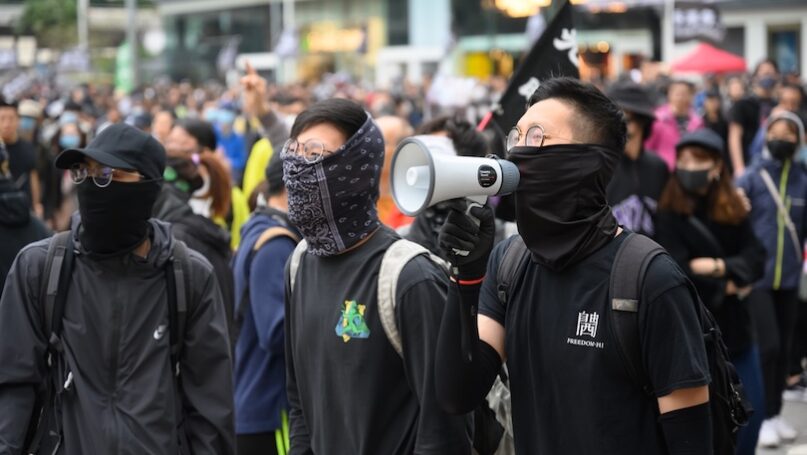
The Tiananmen Square Massacre marked a turning point in China’s political history, shutting down a moment of potential reform and ushering in decades of political silence. Less well known is how a British nationality law passed around the same time quietly shaped Hong Kong’s fate, dividing its people and weakening their ability to resist political repression. When British Prime Minister Margaret Thatcher visited China in September 1982, she proposed that Britain continue administering Hong Kong under a titular Chinese sovereignty after 1997. Deng Xiaoping rejected the idea, but acknowledged Hong Kong’s unique sociopolitical system and promised it could retain its way of life for 50 years after the handover. This compromise became known as “one country, two systems” and formed the basis of the Sino-British Joint Declaration.
The Joint Declaration paved the way for the creation of British National (Overseas), or BN(O), status—a limited form of nationality that maintained a legal link between Hongkongers and the UK after the handover. BN(O) passport holders could travel internationally and receive British consular assistance abroad, but the status fell short of full citizenship and could not be passed to children. Following the negotiations, tens of thousands of families emigrated to Western countries. Once they acquired foreign citizenship, many returned to Hong Kong with peace of mind—confident they could leave again if the political situation deteriorated. This created a class of returnees who stayed on with a safety net.
The 1989 Tiananmen Square Massacre changed everything. Amid mass protests in Hong Kong calling for stronger guarantees, the British government agreed to grant full citizenship to 50,000 heads of household and their immediate families. In total, an estimated 225,000 elite individuals were selected to become British citizens. The British Nationality Selection Scheme, however, was never intended to encourage emigration. Rather, it was designed to retain critical personnel as Thatcher explained at the time:
It is obviously not an easy thing to select the people who are absolutely critical. Some of them who have worked for us in certain positions obviously select themselves. Others, it is a question of those who really, without whose services we could not keep either the prosperity going or the movement in or out and so on.
Thatcher’s assumption was clear: granting British passports to key elites would stem the brain drain and preserve Hong Kong’s stability and prosperity. But the scheme was widely seen as an insurance policy, offering a safety net to those best connected—just in case the Chinese takeover turned sour. She made a political calculation. She hoped that these elites—granted British citizenship—would preserve British influence in Hong Kong after the handover. That turned out to be a serious miscalculation.
Let’s revisit what Chris Patten, the last British governor of Hong Kong, later said about these elites:
Every one of my successors as Chief Executive of Hong Kong either had a foreign passport or had members of their family with foreign passports. The present Chief Executive had a British passport, which she gave up to become Chief Executive. Her husband has a British passport. Her sons have British passports… What is of course a rather unhappy paradox is the people at the moment—the quislings, including members of the police force—doing the persecuting, have British passports, and the ones who are being persecuted, the ones who are being locked up, don’t.
Patten was referring to the 2019 Hong Kong protests. The government at the time, led by Carrie Lam—a beneficiary of the British Nationality Selection Scheme—launched a sweeping crackdown on dissent. Lam had once held a British passport, and her family are still British citizens. Yet she oversaw policies that targeted pro-democracy protesters and dismantled Hong Kong’s freedoms. This was a stark betrayal of what Thatcher had envisioned. The very people granted British citizenship to protect British values had turned against them.
Meanwhile, it was the ordinary Hongkongers—those denied full citizenship—who emerged as the true custodians of the democratic spirit. But unlike full British citizenship, BN(O) status could not be passed to children. After the handover, a generation of young people came of age with no British nationality at all. Patten recognised this. He argued that the people being jailed were often the children of BN(O) holders—young Hongkongers with no legal escape route. The UK government responded in 2022 by expanding the BN(O) pathway to citizenship, allowing children of BN(O)s born after the handover to apply independently if they could demonstrate a link to a BN(O) parent.
But Patten could also have been referring to another group. Before the handover, there were approximately 3.5 million British Dependent Territories Citizens (BDTCs) in Hong Kong. Of these, 225,000 were granted full British citizenship. That left just under 3.3 million people who either registered for BN(O) status or chose not to.
Today, the British government estimates there are around 2.9 million BN(O) holders. This suggests that approximately 375,000 people and their offspring, who never registered, have no access to the BN(O) pathway. In other words, hundreds of thousands of Hongkongers still lack a viable legal route out, despite facing intensifying political repression. The British government should grant citizenship to those who have stood up for Hong Kong’s freedoms. Doing so would continue the historical pattern the UK itself set in motion after the Tiananmen Square Massacre. It would also send a message that loyalty to democratic values, not elite status, should be what binds people to Britain.
Further Reading on E-International Relations
- Opinion – Why Britain Should Back a Hong Kong Government-in-Exile
- Opinion – 25 Years On: Reflecting on Hong Kong’s Handover
- Opinion – How China Is Keeping a British Political Prisoner in Hong Kong
- Is Patriotism Just Obedience? Hong Kong Under the National Security Law
- Opinion – Joshua Wong and Hong Kong’s Right to Self-Determination
- Opinion – When Political Fear Trumps Rights: Same-Sex Couples in Hong Kong